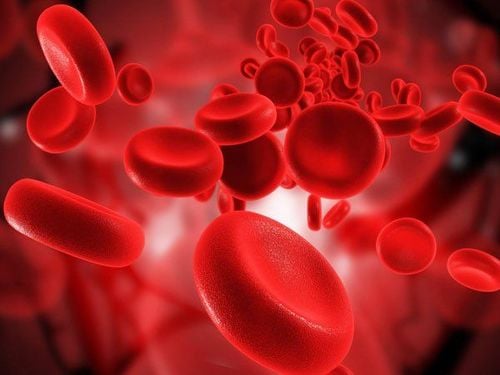This is an automatically translated article.
The article was professionally consulted by MSc Do Thi Hoang Ha - Doctor of Biochemistry, Laboratory Department - Vinmec Hai Phong International General HospitalPhosphorus is an essential mineral for many metabolic processes in the body. Although disorders caused by changes in blood phosphorus levels are relatively uncommon compared with other minerals, these changes can also cause many health complications. Therefore, a quantitative phosphorus test will contribute to the detection and resolution of disorders related to this mineral.
1. What is the role of blood phosphorus?
Phosphorus is a mineral in the body, they exist as inorganic and organic phosphorus compounds when combined with other substances. The role of blood phosphorus is important and varied.First, phosphorus is a substance that plays an important role in many metabolic processes of the body including: biosynthesis of basic substances of the body such as proteins, carbohydrates, cell membrane phospholipids, DNA, RNA; production of cellular energy (in the form of ATP); muscle contraction; heart rate regulation; nerve conduction; In addition, phosphorus is also a substance that helps red blood cells produce the enzyme 2,3-diphosphoglycerate, this enzyme plays an important role in the release of oxygen. from hemoglobin of red blood cells.
About 85% of the phosphorus in the body is stored in the bones in the form of calcium phosphate salts such as the minerals Ca2+[Ca3(PO4)2]32- and hydroxyapatite Ca10(PO4)6(OH)2, this form of phosphorus plays an important role. important in the structure of bones and teeth. About 10% of phosphorus is stored in soft tissue (mainly muscle, about 1% exists in nerve tissue). The remainder is involved in the intermediate metabolism of carbohydrates and is found in cells throughout the body as important compounds such as phospholipids, nucleic acids and ATP, where they are used primarily for energy storage. Phosphorus in the blood accounts for only about 1% of total phosphorus in the body, exists in the form of inorganic and organic phosphate bound to phosphoric acid. A small amount of extracellular organophosphorus is found mainly as phospholipids and only about 0.1% exists in the extracellular fluid as inorganic salts and is determined by serum phosphorus testing. Serum inorganic phosphate levels are maintained within a narrow range through the complex interplay of intestinal absorption, exchange with intracellular and bone stores, and tubular reabsorption.

2.Effects of blood phosphorus disorders on health
The body maintains blood phosphorus levels by regulating intestinal absorption and renal excretion. Phosphorus levels are also affected by the regulation of parathyroid hormone (PTH), calcium and vitamin D.When blood phosphorus levels exceed normal levels can cause myocardial damage, lung damage, confusion erythrocyte and white blood cell dysfunction. When the amount of phosphorus in the blood decreases, it will affect the phagocytic ability of white blood cells, leading to susceptibility to bacterial or opportunistic infections... Therefore, the phosphorus test has a very important meaning and role. timely detect the deficiency or excess of phosphorus in the blood, thereby taking timely treatment measures, preventing complications caused by disorders of phosphorus levels.
3.Indications for blood phosphorus determination

In addition, in some cases, a phosphorus test may be indicated, such as:
Urinary or digestive disorders; After surgery; Rickets ; Vitamin D deficiency or vitamin D toxicity; malabsorption syndrome; Use of phosphorus-lowering drugs; Hyperparathyroidism; After kidney transplant, chronic kidney disease; Rhabdomyolysis syndrome; Heart stroke. In addition, the periodic determination of phosphorus in patients with chronic renal failure can be indicated as follows:
Chronic renal failure stage 3 tested every 12 months; Chronic kidney failure stage 4 tested every 3 months; Chronic renal failure on dialysis periodically tested once a month; Patients taking phosphorus-lowering drugs tested every 2 weeks.
4.Normal value of blood phosphorus
Normal blood phosphorus levels in adults are between 0.81-1.45 mmol/L (2.5-4.5 mg/dL).The concentration of phosphorus in the blood in infants is about 50% higher than in adults (1.25-2.50 mmol/L or 3.9-7.7 mg/dL), in children about about 50% higher than in adults. 30% (depending on stage and age). Blood phosphorus levels in children tend to be higher than in adults because their bones are in a period of strong growth.
5.Meaning of quantitative blood phosphorus test

Renal failure (with a decrease in glomerular phosphate filtration) Diseases related to liver function; Hypoparathyroidism ; Diabetic complications of ketoacidosis (at first appearance); Advanced bone cancer; Increases due to diet (phosphorus supplements, use of foods rich in phosphorus such as beans, peas and nuts, cereals, dairy products, eggs, beef, chicken, fish.. ). Vitamin D poisoning High blood phosphorus levels can lead to cardiovascular disease or osteoporosis, even lead to organ damage due to calcification, calcium phosphate deposition in organ tissues.
b. Hypophosphataemia The causes of low blood phosphorus levels include:
Hypercalcemia disorders, especially due to hyperparathyroidism; Excessive use of diuretics; Patients with malnutrition, malabsorption Alcoholism; Severe burns; Diabetic ketoacidosis (after treatment); Acid-base imbalance Hypothyroidism; Disorders affecting kidney function End-stage decompensated cirrhosis; Hypokalemia; Chronic use of antacids; Rickets and osteoporosis (due to vitamin D deficiency). Fanconi syndrome Postoperatively (about 30% of postoperative patients). Low blood phosphorus levels in children can lead to limitations in bone growth and height as well as a reflection of the body's mineral imbalance.
Therefore, when you find yourself having any unusual symptoms, you need to go to medical facilities for advice, examination and treatment immediately. Blood Phosphorus test is often used together with other tests such as quantification of parathyroid hormone PTH, blood calcium, quantification of Vitamin D. Vinmec International General Hospital is a high quality medical facility in Vietnam with a team of doctors and nurses with high professional qualifications, well-trained, specialized in domestic and foreign countries, rich in experience.
The medical equipment system at the testing department of Vinmec International General Hospital is modern and advanced, possessing many of the best machines in the world to help detect many difficult and dangerous diseases in a short time, Support the most effective diagnosis and treatment of doctors. The hospital space is designed according to 5-star hotel standards, giving patients comfort, friendliness and peace of mind.
Please dial HOTLINE for more information or register for an appointment HERE. Download MyVinmec app to make appointments faster and to manage your bookings easily.














